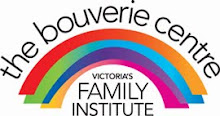In June this year the first child ever born through IVF in Australia turned 30. In this same month, the NSW Parliament debated whether to allow lesbian and gay couples to adopt children; journalists clamoured to ask the new Prime Minister to clarify her stance on gay marriage; and the media revealed findings from a high profile US study: children of lesbian parents grow up well adjusted. Like it or loathe it, the past few decades have ushered in a whole new social landscape for Australian families. Within this, lesbian and gay parents have achieved unprecedented levels of visibility. But for all that visibility, what is life really like for these parents and their children?
There are pockets in inner city areas where lesbian and gay parenting is pretty normalised and there is a lot of support available. There are 'Rainbow' playgroups where kids and adults find like minded friends, it is not hard to find services that openly promote themselves as gay friendly and most schools have pretty good anti-homophobia programs. Living in the inner city, however, isn't an option or a preference for many people – even gay people.
I am involved in some research at La Trobe University looking at the experiences of lesbian and gay parents. Surprisingly, of the 450 families who took part in our study, close to 60% did not live in the inner city. Instead, these families lived in the outer suburbs or regional/rural areas of Australia.
There is a lot of idyllic imagery associated with rural life. The pace is slow, towns feel safe and community bonds are strong and genuine. But the flip side of this can be a lack of anonymity and diversity that makes it hard for people to be 'different' in small towns. Sadly, a lot of what we hear about gay life in rural Australia relates to the high rate of suicide among young men who can't bear the shame or pain of 'coming out' to their small community.
The experiences of people in our study were thankfully not this extreme. On the whole, people reported feeling well connected to their local communities. For them, the biggest challenges of parenting related not to homophobia but to managing toddler tantrums, paying the mortgage or calming teenage mood swings.
However, the gay and lesbian parents in our study were cautious about exposing their family life. They were much less likely than those who lived in the inner city to be open about their sexuality or family life to health service providers – their own doctors or their children's. Even among social and recreational groups, people were less likely to reveal their sexuality or talk about their relationships. Children of lesbian or gay parents living in rural/regional areas were also much more likely to have experienced homophobic related bullying or discrimination at school.
On top of this, although most people in the study said they had strong support from their extended families, people living in rural/regional areas, unlike those in the inner city, often did not have support from other gay or lesbian families and their children were less likely to know other children from similar families.
None of this means that life is terrible for gay or lesbian parents living in small towns. In fact, when we asked people what were the best things about their family life, people wrote beautiful words about their happy and close families. But I think this study does point to a real lack of visibility and support for lesbian and gay parented families in non-metropolitan areas. It's important that people feel they can be open with service providers, particularly their doctors, and children from all families have a right to feel safe at school. If this is not the case at present, then work needs to be done educating schools, service providers and the local community about the diversity of family life that no doubt exists in their towns.
I would be willing to bet that most people living in rural or regional Australia have not (knowingly) met many lesbian or gay parents. Unfortunately, media reporting doesn't always paint the rosiest picture of these families. Despite a lot of public support for gay and lesbian families, there is also a lot of criticism. And it can be harsh. It takes guts to be gay sometimes, especially in small towns. A show of support within local communities, even simple gestures like a display in a doctor's waiting room of posters or stickers acknowledging gay families, can make a huge difference to the lives of gay men and lesbians and their children.
Wednesday, October 27, 2010
Subscribe to:
Post Comments (Atom)


.jpg)



No comments:
Post a Comment